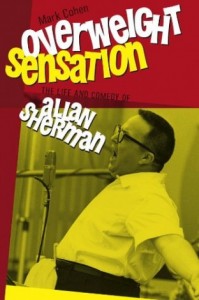
 Welcome to Spit Take Saturday, courtesy of Brown Paper Tickets’ Comedy Doer Julie Seabaugh and her professional comedy criticism site The Spit Take. Julie’s goal with the site is to “elevate the public perception of stand-up comedy to that of a legitimate art form, and to enable comedy criticism be taken as seriously as that of theater, film, music, food, even video games. No a**-kissing. No bias. No mercy. Just honest, unfiltered, long-form reviews written by professional, knowledgeable comedy critics.”
Welcome to Spit Take Saturday, courtesy of Brown Paper Tickets’ Comedy Doer Julie Seabaugh and her professional comedy criticism site The Spit Take. Julie’s goal with the site is to “elevate the public perception of stand-up comedy to that of a legitimate art form, and to enable comedy criticism be taken as seriously as that of theater, film, music, food, even video games. No a**-kissing. No bias. No mercy. Just honest, unfiltered, long-form reviews written by professional, knowledgeable comedy critics.”
Every week Julie will select an entry from the site to be included on our blog and hand-pick some related events happening that week that she feels all you comedy lovers out there will appreciate.
So, without further ado, let us introduce you to this week’s Spit Take Saturday!
Most casual comedy fans know Allan Sherman as the guy who wrote the summer camp parody song “Hello Muddah, Hello Faddah.” Or at least they’ve heard it somewhere, in a commercial or on the radio, even if they couldn’t identify Sherman by name. In Overweight Sensation, Mark Cohen argues for a much more robust legacy, one that puts Sherman at the forefront of opening up American society to ethnic humor.
This is not a standard, chronological biography. Cohen takes some liberties with the timeline, moving forward and back to further draw out his thesis. The result is a scattered and somewhat flawed narrative, but one that focuses on Sherman and his efforts to mix English and Yiddish in popular song parodies, a sort of Trojan Horse designed to bring Jewish culture into the mainstream.
Sherman was a wit early on, possibly a defense mechanism (as the common theory about comedians goes) to protect him from parents who were at best ambivalent about his existence. His father was absent, the family moved frequently, and Sherman never got much of a chance to settle into a normal life. That created an adult with an idealized picture of childhood and heightened sense of lust and gluttony. He was a neglectful father and husband. And until he lost his TV show, I’ve Got a Secret, he could even be lazy about his work. Then he changed gears and pushed hard, probably too hard for some of his TV co-workers. That’s when he finally broke through with My Son, the Folk Singer, recorded in 1962.
Many of Sherman’s contemporaries were Jewish, but they didn’t emphasize it in their work. Ethnicity was discouraged during World War II in favor of a homogenous “Americanism.” Sherman, Cohen asserts, turned that idea on its head by writing parodies that reinserted ethnicity into the songs. It’s an interesting thesis, begging a question not necessarily answered here. To what extent is an artist obligated to show his or her ethnicity in their work?
Cohen’s prose isn’t perfect. There are general quotes with no attribution to source material. On page 47, he discusses rising anti-Semitism and writes broadly, “college Jews avoided those ‘who were too stereotypically “Jewish” in manner or appearance.’” If the phrase hasn’t come from a specific source, why put it in quotes? And some stories are brushed aside with few details. After Sherman’s mother died, Allan’s half-brother and half-sister searched for their father, Dave. The half-sister talks about “one amusing story” from that time concerning finding money in a closet, but readers get no details about where the story took place or why it was amusing.
But Cohen gets cooking after the first 100 pages, when Sherman breaks through as a parodist. He’s able to put Sherman firmly in the context of his time, recreating the art, culture and politics of the age. His conclusions are sometimes debatable, but isn’t that the point of a book like this in the first place? ![]()
Follow @SpitTakeComedy on Twitter or Like us on Facebook.
________________________
Check out some upcoming tributes to other comedy luminaries:
Thursday, June 13-Friday, July 5 I An Intimate Evening With Bea Arthur Starring DJ Schaefer – Studio City, California DJ Schaefer will portray Bea Arthur in an intimate musical evening designed to delight and inform. Bea Arthur considered by many to be one of the greatest comedic TV and Broadway Actresses will regale you with stories and songs of her life. Stopping by will be various celebrities who played a part in her life.
Friday, June 14-Tuesday, July 23 I Randy Roberts – LIVE! – San Francisco, California Incredible impersonations of “Bette Midler”, “Joan Rivers”, “Mae West”, “Cher” (an act the New York Times calls “…spot on”) and many more.
Saturday, August 24 I An Intimate Evening with Carol Channing and Justin Vivian Bond – Cherry Grove, New York In one of the most ingenious pairings since Liza Minnelli and Alan Cumming, Daniel Nardicio presents the living legend, 3 time Tony Award winner Carol Channing and Tony nominated queer icon, Justin Vivian Bond in an intimate evening of stories and song. Bond will be moderating a Q and A with Ms Channing.


 Arts
Arts Comedy
Comedy Event Tips
Event Tips Film
Film Food & Drink
Food & Drink Good Causes
Good Causes Music
Music News
News Radio
Radio Roller Derby
Roller Derby